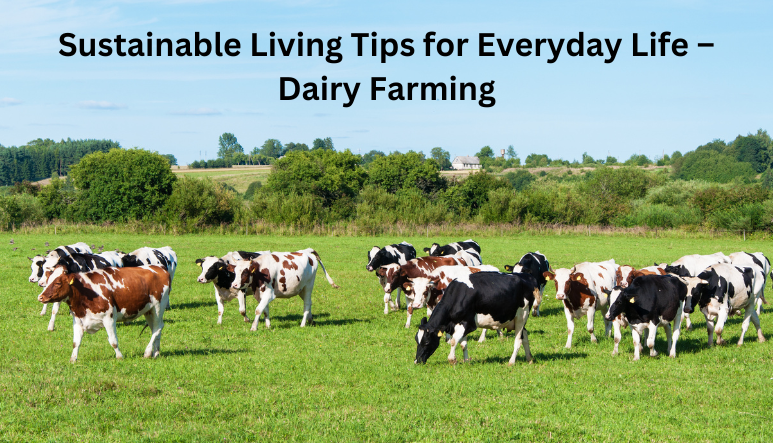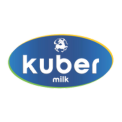Sustainable Living Tips for Everyday Life – Dairy Farming

13
JanIn the current age, it is very important to practice sustainability. Everything we decide on, whether it is the products we buy or even food we eat, influences the world around us. Dairy farming is especially problematic in this case as it does add to our global footprint. But good decisions and practices can reverse the possible harm and reduce such footprints from being left behind which will promote a better, greener future.
If you are a dairy lover who wants to know the impact of their choices on the world or a pro-sustainable person who is in search of tangible solutions, this piece will guide you through the sustainable dairy farming world. What you can do as a consumer to adopt an eco friendly farming with all its challenges and solutions can be found here.
What Is Sustainable Living, and Why Does It Matter?
Living sustainability means opting for choices that are both suitable for you and the environment. It’s about leveraging your resources well, making the best use of everything, and ensuring that what is done at the moment does not mean that future generations will be disadvantaged.
The example of the dairy industry illustrates the impact on the environment, such as greenhouse gas emissions, water use, and land use. However, promoting sustainability does not mean getting rid of dairy – it is simply seeking alternative smarter ways of producing, consuming and supporting dairy farming.
Dairy farming if practiced rightly can ensure environmental sustainability while protecting the much-needed nutrients for billions across the globe. That’s what companies like Kuber Dairy Group undertake perfectly, combining business and environmentally friendly developments.
Understanding the Impact of Dairy Farming on the Environment
- Greenhouse Gas Emissions
Did you know that dairy farming accounts for roughly 4% of total global greenhouse gas (GHG) emissions? Methane from cows, produced during digestion, is a primary contributor. Additionally, energy-intensive processes like pasteurization and milk powder production add to the emissions.
- Water Usage
Producing one liter of milk requires about 1,000 liters of water—this includes water for cows to drink and for growing the crops they consume. Without water management strategies, the dairy sector can strain local water resources, particularly in areas already dealing with scarcity.
- Land and Soil Degradation
Large-scale farming often involves intense crop production for cattle feed, which can lead to soil depletion, deforestation, and loss of biodiversity if not managed responsibly.
Despite these challenges, forward-thinking dairy producers like Kuber Dairy Group are proving that sustainable practices can make a difference.
Sustainable Practices on Dairy Farms
Kuber Dairy Group’s Sustainable Approach
Kuber Dairy Group, a global leader headquartered in Estonia and India, is redefining how dairy is produced. With operations spanning Europe, India, and the Americas, they’ve implemented eco-conscious methods throughout their production cycle. Here’s how:
- Eco-Efficient Milk Powder Production: By manufacturing cost-effective milk powder blends for baked goods, ice creams, and beverages, Kuber Dairy Group reduces waste while offering sustainable alternatives.
- Collaborations for Sustainability: Through joint ventures with producers across Europe and the Americas, they emphasize local sourcing and reduce transportation emissions.
- Commitment to Circular Economy: Their facilities focus on reusing water, reducing energy consumption, and recycling waste by-products like manure for agricultural use.
These innovative steps show how sustainable farming practices can align with global business goals.
Wider Industry Practices
Other sustainable methods include:
- Rotational Grazing: Allowing cattle to graze in different areas prevents overgrazing and soil degradation.
- Renewable Energy: Many farms are switching to solar and wind energy to power their operations.
- Precision Feeding: Optimizing feed efficiency not only reduces costs but also cuts methane emissions.
Farmers adopting these approaches are helping create a more sustainable dairy industry.
Tips for Consumers to Support Sustainable Dairy Farming
Here’s how you can get on board and make a difference as a dairy consumer:
- Buy from Eco-Friendly Brands
Look for companies like Kuber Dairy Group that prioritize sustainability in their processes. Their commitment to ethical, environmentally conscious practices ensures the dairy you purchase aligns with your values.
- Choose Local and Seasonal Dairy
Buying dairy products from local farms reduces transportation emissions and supports community farms practicing eco-friendly methods.
- Buy What You’ll Eat
Food waste is a growing issue—40% of food in the U.S. goes uneaten, contributing to methane emissions in landfills. Only purchase and consume what you need to avoid waste.
- Support Organic and Biodynamic Farms
Organic dairy products are often produced with stricter guidelines to minimize environmental impact. Biodynamic farms go a step further, integrating holistic farming practices that benefit the soil, animals, and ecosystem.
- Explore Plant-Based Alternatives Responsibly
For those reducing dairy intake, plant-based options are great alternatives. However, ensure they are sustainably sourced—some require significant water usage (e.g., almond milk). Balancing your choices with mindfulness is key.
- Advocate for Change
Support government policies and private sector initiatives promoting sustainable agricultural practices. Every voice counts!
Case Studies of Successful Sustainable Dairy Farms
To inspire further action, here are two examples of farms leading the charge:
Kuber Dairy Group – Estonia & India
From their milk powder blending facilities in Europe and India to their innovative collaborations across continents, Kuber Dairy Group is setting new standards in global dairy production. Their efficiency-focused processes demonstrate how sustainability can enhance profitability while protecting the planet.
Organic Valley Cooperative – USA
This cooperative of small family farms champions organic practices like rotational grazing and renewable energy. Their commitment shows how small changes in farming methods can have a massive environmental impact.
These success stories highlight that sustainability isn’t just possible—it’s profitable.
Take the First Step Toward a More Sustainable Future
The path to sustainability begins with small yet mindful changes. Whether by choosing eco-conscious dairy brands, supporting sustainable farms, or advocating for greener policies, your choices matter.
Brands like Kuber Dairy Group are proof that the dairy industry doesn’t have to compromise the planet to deliver quality. By blending expertise with sustainability, they create products that nourish both people and the earth.
Take action today. Start by supporting sustainable dairy brands like Kuber Dairy Group—and make your everyday choices count toward a greener future.
